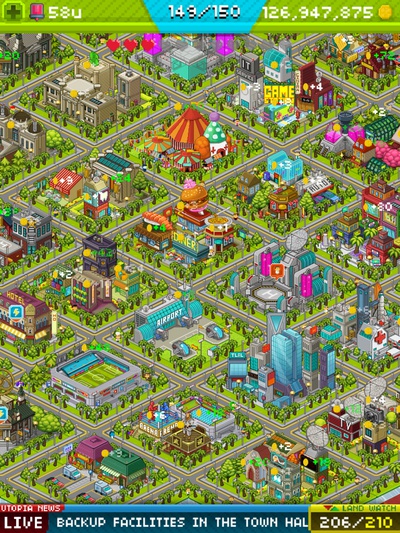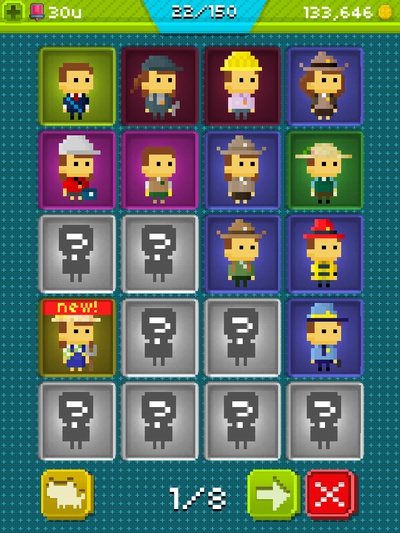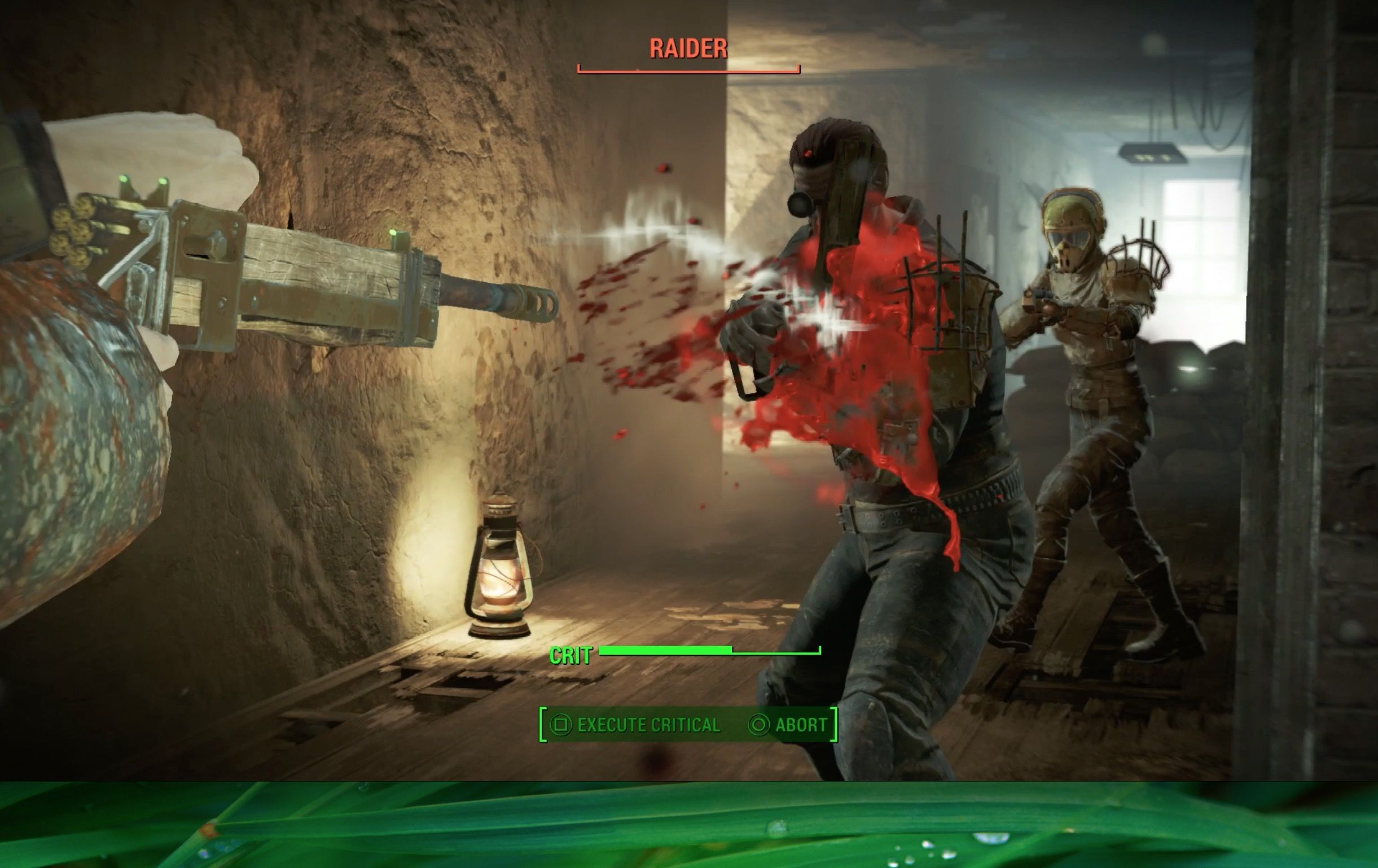


Pixel People is precisely engineered to draw you in at the very start. Load up the iOS game for the first time, and you're presented with three pixel-art buildings floating serenely in deep space, with naught but a small piece of road and a few trees to keep them company. Gentle music that has not yet had the chance to become repetitive twinkles with the sound of hope and new beginnings, as the first pixel person you meet – an engineer called Eve Jobs – pops up to teach you how to build a utopia.
It's much easier than it sounds. Tap an empty space to place a building of your choice. Put down a house, and once it's built clones will arrive to occupy it. Of course, a city populated with clones would be confusing and unproductive, so you'll want to transform that clone into something more resemblant of the humans that existed before the unexplained catastrophe that wiped out the Earth. That's also simply done: just splice together a “Mechanic” gene (thanks, Eve!) with a “Mayor” (you too, Adam Zappel!) and you get a brand-new human being defined by its vocation, in this case an engineer.
In a world in which people can no longer reproduce in the most popular human fashion, this is how babies (well, fully-formed adults) are made. And even though it doesn't involve sex, it's pretty exciting. Every time you discover a new kind of job you get to slide your finger across a dotted line like you're opening a booster pack of trading cards, except you're guaranteed something new because the game colour-codes which valid combinations you haven't tried yet. Each new job comes with a pun-based name – Laura Norder (sheriff [mayor + mayor]), Anne Teak (historian [philosopher + librarian]), Noah Lotte (philosopher [dreamer + dreamer]) – and you get a point added to your tally of total jobs discovered. Not only that, but a lot of the jobs come with a new building to add to your city, so you get the enjoyment of deciding where that should go, and then once it's built it starts to produce money that you can use to fund further growth.
The ratio of reward to action is very high at first. But then the game slowly introduces logistics – like the need to wait for construction on that building to finish before the clones taking up space in the arrival centre can move in, the need to buy more land before you can place a new building down, the need to tap money-producing buildings until you've got enough to afford more land – that prevent you from progressing at the same speed. Unless, of course, you're willing to pay for the privilege. And here's where some gamers will refuse to hear anymore, even if I tell them that this is the first game that heavily features micro-transactions that I've actually enjoyed. But Pixel People is far from pushy, especially when compared with other games with these features. It's like the British cabbie as opposed to the American version, not expecting a tip but happy to make it clear that it wouldn't say no.

So for those who don't want to pay for whatever reason, it's easy to ignore the option, especially at first. Most processes – building construction, clone arrival, etc. – can be sped up with utopium, and while you can purchase that with real-life money you can also collect it daily from your mine and forests, or even – in a particularly clever implementation – earn it through watching adverts once you've unlocked the TV station. If you haven't got the utopium, then all you need is the patience to wait for increasing lengths of time.
It's undeniable that these arbitrary waiting periods only exist to encourage the impatient sort to hand over a few pennies every now and then. But while they're still short, you don't feel too cheated. Players who frequently step back from a game to consider what they're doing may start to lose interest at this point, but the feedback loops are still pretty tight. Building construction is quick enough that by the time you've tapped all your other buildings to prompt them into producing more coins the newest one is done, or a new clone has arrived, or you've made enough coin to buy more land onto which to expand.
Soon enough, however, at around the time when you've started to invest in your little city as a functioning whole, the time it takes to construct a building or the amount of money you need to expand your land usage becomes much higher; it's no longer just a case of spending a few minutes tapping on a few buildings until things have run their course. At this stage, it becomes clear that you'll have to spend some money to make something happen or just walk away and only come back every now and then to tap those buildings back into production, letting time do most of the work for you. At this stage, you begin to wonder if the creators of Pixel People deliberately designed a world in which very little seems to happen except in those moments of expansion, in order to tempt people to pay to speed through the calm interludes before each explosion of growth.
Whether or not a player will stick with Pixel People until she has discovered all 150 (or 155, with the current update) jobs will depend on how willing she is to continue playing when it becomes a different kind of game. When time or money keeps you from the actual progress of splicing clones but you still want to interact with the game, you'll just spend a lot of time tapping businesses for money, or houses for hearts (produced by the heterosexual couples who live there, presumably in place of the babies they cannot have). When you get enough of these hearts you'll get a prize, either a fixed amount of money that only seems substantial the first time it happens and feels measly from then on, or a collectable animal, which will live in your forests.

You could spend a little time exploring the unique features some of the buildings offer, like the toggle at the dating agency that changes the coin symbols that pop out of the productive buildings to (non-collectable) hearts, though there aren't that many examples. Or maybe you'll spend some time moving those buildings around, connecting them with roads that cost money but not land and serve no purpose other than an aesthetic one. If you want to make it feel like you're influencing your city rather than just watching it, then you could try transferring people from one workplace to another, hoping to bank on the fact that a full building produces twice as much money and can have other benefits as well. Or you could spend some utopium on upgrading buildings so that they produce money for longer before you have to tap them back into action. But aside from that, this game really doesn't have much scope for strategic play.
Some players will be disappointed that Pixel People lacks the complexity it seems to suggest, that it isn't quite the example of a mobile game for the more “hardcore” gamer that they were looking for. But for those who never had those expectations in mind, this game has plenty to offer. It radiates charm, provides a world that is undemanding enough in its organisation and management that it's relaxing, clear (if simple) goals for you to work towards and even discuss with friends. If you don't mind playing in brief sessions with a long wait in between (or paying to speed things along), then this is a game that will hold your interest for much longer than most of its kind.
7 out of 10
Pixel People was developed by LambdaMu Games and published by Chillingo. It was released on January 21st 2013, and is free to play. A copy was provided by the publisher for the purposes of review.




 A Sum of Parts: The Point of Points and The Gamification of Videogames
A Sum of Parts: The Point of Points and The Gamification of Videogames Fallout 4 Guide: How to Fix the Invisible Weapon Bug
Fallout 4 Guide: How to Fix the Invisible Weapon Bug Assassins Creed Brotherhood Walkthrough Video Guide in HD
Assassins Creed Brotherhood Walkthrough Video Guide in HD How to use TV, Keyboard and mouse with PlayStation 4
How to use TV, Keyboard and mouse with PlayStation 4 Gears of War Judgement Part 3 (Sophia’s Testimony Sections 1-3)
Gears of War Judgement Part 3 (Sophia’s Testimony Sections 1-3)